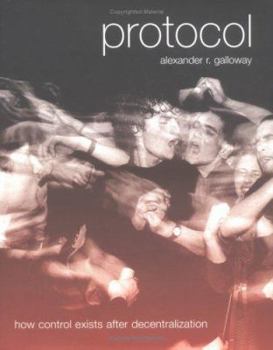Protocol: How Control Exists After Decentralization
Select Format
Select Condition 
Book Overview
How Control Exists after DecentralizationIs the Internet a vast arena of unrestricted communication and freely exchanged information or a regulated, highly structured virtual bureaucracy? In Protocol,... This description may be from another edition of this product.
Format:Hardcover
Language:English
ISBN:0262072475
ISBN13:9780262072472
Release Date:January 2004
Publisher:MIT Press (MA)
Length:260 Pages
Weight:1.66 lbs.
Dimensions:0.9" x 7.3" x 9.1"
Customer Reviews
4 ratings
A must-have if you're interested in the art, tech, or culture of networks
Published by Thriftbooks.com User , 18 years ago
Galloway is a triple threat: he's fluent in the esoteric dialects of poststructuralist theory, Internet geekspeak, and network aesthetics. There are plenty of books that try to tackle the art and politics of the Internet age from one of these angles, and a handful that try two--but if you're looking for a three-dimensional treatment of the subject, this is the book for you. Protocol's subtitle, How Control Exists after Decentralization, gives away Galloway's intention in writing this book, which is to steer a path between the "media are chains" intonations of broadcast media critics and the "networks make us free" hype of Internet evangelists. The fact that he's trying to erect a new theory in this uncharted territory makes this book a valuable contribution to the field. Sometimes I think he loses his path along the way, as when he veers afield from his focus on networks to apply his ideas to an abstract "biopolitics" or to propose an aesthetic interpretation of Marx. None of these efforts is misguided or irrelevant, and academics with heads in the clouds will probably love these parts. Personally, however, I find Protocol most useful not when it connects one theory to another, but when it connects a theory to a specific technical specification. When Galloway pulls A Thousand Plateaus of the shelf to reveal the politics underlying the Internet's fundamental TCP/IP protocols, he's not just showing off his booklearning--he's upgrading Deleuze and Guattari's theory for use in the field, so we can apply their radical philosophy to the email and chat applications we design and deploy. If you're a teacher trying to explain the relevance of dead European philosophers to students who'd rather be learning the latest PhotoShop filter or IM client, Protocol is a great translator between these realms. In my classes, I make them read an excerpt on a specific topic--network diagrams, for instance--but I also ask them to analyze the handy tables and photographs Galloway uses to condense and illustrate his points. (Disclaimer: I know the author from our mutual work in the field of Internet art. That said, I know a lot of the authors of recent books on new media--it's the nature of the field.)
How the idea was born...
Published by Thriftbooks.com User , 19 years ago
A thought occurs to the author, "human beings have a protocol of sorts that allows them to cooperate.. that keeps them under _control_". He sits around, has some coffee. Eats a bagel. And then it hits him, "Oh my God, the Internet is made up of _computer protocols_!!", and a book is born.
Computer Science from a Liberal Arts View.
Published by Thriftbooks.com User , 19 years ago
Some of the most interesting work being done today is a result of the cross fertilization of intellectual fields. While this is somewhat of a computer scienct book about the protocols of the internet, the author is a professor of Media Ecology. When he talks of the Internet and its protocols it's almost as if he is using different words.It has long been a contention of mine that the Internet, both the world wide web and e-mail needs to be view as a transition in media not unlike that brought about by Gutenberg. Here the Internet and its interactions with both people and machines is analyzed like other media. What is the impact on society of a computer virus? How does this differ from the impact of the AIDS virus? And is the computer virus the problem or the weakness of the underlying programs - after all, most viruses use weaknesses in Microsoft Outlook to spread themselves.We are at a time when the internet is changing our lives. It's good to see that people other than just technologists are looking at where we are going.
Computer Science from a Liberal Arts view.
Published by Thriftbooks.com User , 19 years ago
Some of the most interesting work being done today is a result of the cross fertilization of intellectual fields. While this is somewhat of a computer scienct book about the protocols of the internet, the author is a professor of Media Ecology. When he talks of the Internet and its protocols it's almost as if he is using different words.It has long been a contention of mine that the Internet, both the world wide web and e-mail needs to be view as a transition in media not unlike that brought about by Gutenberg. Here the Internet and its interactions with both people and machines is analyzed like other media. What is the impact on society of a computer virus? How does this differ from the impact of the AIDS virus? And is the computer virus the problem or the weakness of the underlying programs - after all, most viruses use weaknesses in Microsoft Outlook to spread themselves.We are at a time when the internet is changing our lives. It's good to see that people other than just technologists are looking at where we are going.




